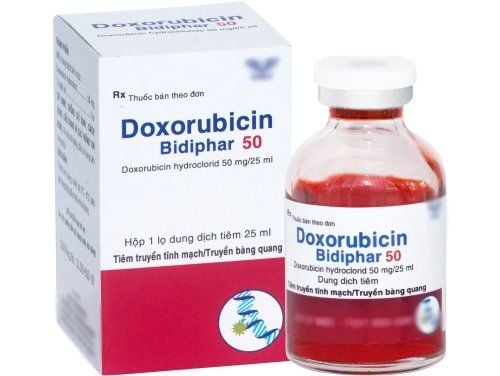This is an automatically translated article.
Abemaciclib is available in tablet form and is used to treat adult breast cancer. The following is detailed information about the uses, dosage, side effects,... of this medicine.
1. Uses of the drug Abemaciclib
Abemaciclib is an anticancer agent. In 2017, the FDA approved the use of Abemaciclib (marketed as Verzenio) for the treatment of breast cancer. Abemaciclib is also used in trials studying the treatment of melanoma, lymphoma, neoplasia, glioblastoma, and solid tumors.
Abemaciclib drug is indicated in the treatment of breast cancer. The drug works by slowing or stopping the growth and development of cancer cells. Some other side effects of Abemaciclib are not listed. The doctor may prescribe the patient to use the drug to treat a number of other conditions.
2. How to take and dose Abemaciclib
2.1. How to take Abemaciclib Take Abemaciclib with or without food exactly as directed by your doctor, usually twice a day. The patient should not chew, crush or break the tablet, but swallow the tablet whole with a glass of water. Patients should also not take the drug if it is cracked, broken, or not intact. If you vomit the medicine after taking it, you should not take another dose, but take the next dose at the prescribed schedule.
2.2. Dosage for adults with breast cancer With combination therapy: Use 150mg, 2 times a day; For monotherapy: Use 200mg, orally twice a day. Dosage for children: Consult your doctor before giving this medicine to children.
The above dose of Abemaciclib is for reference only. Depending on the medical condition of each patient, the doctor can prescribe the appropriate dose.
2.3. Overdose In the event of an emergency or overdose, the patient should immediately notify the doctor, call 911 or go to the nearest hospital. Patients should also keep a record of the medications they have taken and notify their doctor for appropriate management.
2.4. Missed dose If you forget to take a dose of Abemaciclib, you should take it as soon as possible. If it is almost time for your next dose, you can skip the missed dose and take your next dose as scheduled.
3. Side effects of the drug Abemaciclib
During the use of Abemaciclib, patients may experience some unwanted side effects such as:
Nausea, vomiting, abdominal pain, loss of appetite, constipation, fatigue, weight loss, headache, changes in taste,... If these symptoms persist or worsen, the patient should notify the doctor; Diarrhea is also a common side effect of Abemaciclib, which can cause severe dehydration. In case of diarrhea, the patient should immediately notify the doctor for an anti-diarrheal medicine such as loperamide. Patients should also drink plenty of fluids to reduce the risk of dehydration. At the same time, the patient should immediately notify the doctor if there is an abnormal decrease in urination, thirst, dry mouth, dizziness, tachycardia,...; When taking Abemaciclib, patients may experience temporary hair loss. However, after finishing the treatment, the hair will grow back normally; Patients should tell their doctor right away if they experience any serious side effects such as: Unusual tiredness, easy bruising or bleeding (bleeding from the nose or gums, pink or dark urine), signs of signs of liver damage (nausea, vomiting, loss of appetite, abdominal pain, jaundice, yellow eyes, dark urine); Abemaciclib may decrease your body's ability to fight infections, increase your risk of infection, or make an existing infection more serious (rarely fatal). Patients should tell their doctor if they have any signs of infection such as fever, persistent sore throat, cough, chills, etc.; Abemaciclib rarely causes blood clotting (pulmonary embolism, heart attack, deep vein thrombosis, stroke). However, you may be at increased risk of blood clots if you are severely dehydrated or have a history of blood clots. Patients are also at risk of blood clots if using products containing estrogen; Patients should call 911 immediately if they have any of the following side effects: Shortness of breath, shortness of breath, chest/jaw/left arm pain, confusion, dizziness, unusual sweating, fainting, pain/swelling/warmth. in the groin/calf area, sudden severe headache, weakness on one side of the body, difficulty speaking, sudden vision changes; Very rarely, a very serious allergic reaction to Abemaciclib. However, if you notice any symptoms such as severe dizziness, difficulty breathing, rash, itching/swelling of the face, tongue, throat, etc., the patient should call 911 immediately.
4. Be careful when taking the drug Abemaciclib
Before and while taking Abemaciclib, patients should note:
Inform your doctor if you are allergic to any of the ingredients in the drug; Tell your doctor if you have or have ever had a medical condition such as liver disease, blood clotting problems (eg, stomach bleeding); When taking Abemaciclib, you should not get the vaccine without your doctor's approval. In addition, you should also avoid contact with people who have recently received a live vaccine; Before surgery, patients should tell their doctor or dentist about any medications they are taking, including Abemaciclib; You should tell your doctor if you are pregnant or plan to become pregnant. You should also not become pregnant while taking Abemaciclib because it can harm the unborn baby; You should not breast-feed while using Abemaciclib for at least 3 weeks after you stop taking it. It is best to consult your doctor before breast-feeding; Abemaciclib can make you more likely to get an infection or make an infection you already have worse. Therefore, you should avoid contact with people with contagious infections (chicken pox, measles, flu, etc.) and consult your doctor if you have been exposed to an infectious agent. ; Abemaciclib can make you dizzy. Therefore, you should not drive, operate machinery, or do anything that requires alertness until you can do it safely.
5. Abemaciclib drug interactions
Some of Abemaciclib's drug interactions include:
Drugs that can affect the removal of Abemaciclib from the body, leading to changes in the way Abemaciclib works. These are: azole antifungals, macrolide antibiotics, HIV protease inhibitors, rifamycins, anticonvulsants, nefadozone, telithromycin,...; Avoid eating grapefruit or drinking grapefruit juice while taking Abemaciclib because grapefruit can increase the risk of side effects with the medicine. When using Abemaciclib to treat breast cancer or other conditions, patients should absolutely follow all instructions given by their doctor. If any serious adverse reaction occurs, the patient should discontinue the drug and notify the physician immediately for appropriate advice.
Please dial HOTLINE for more information or register for an appointment HERE. Download MyVinmec app to make appointments faster and to manage your bookings easily.













